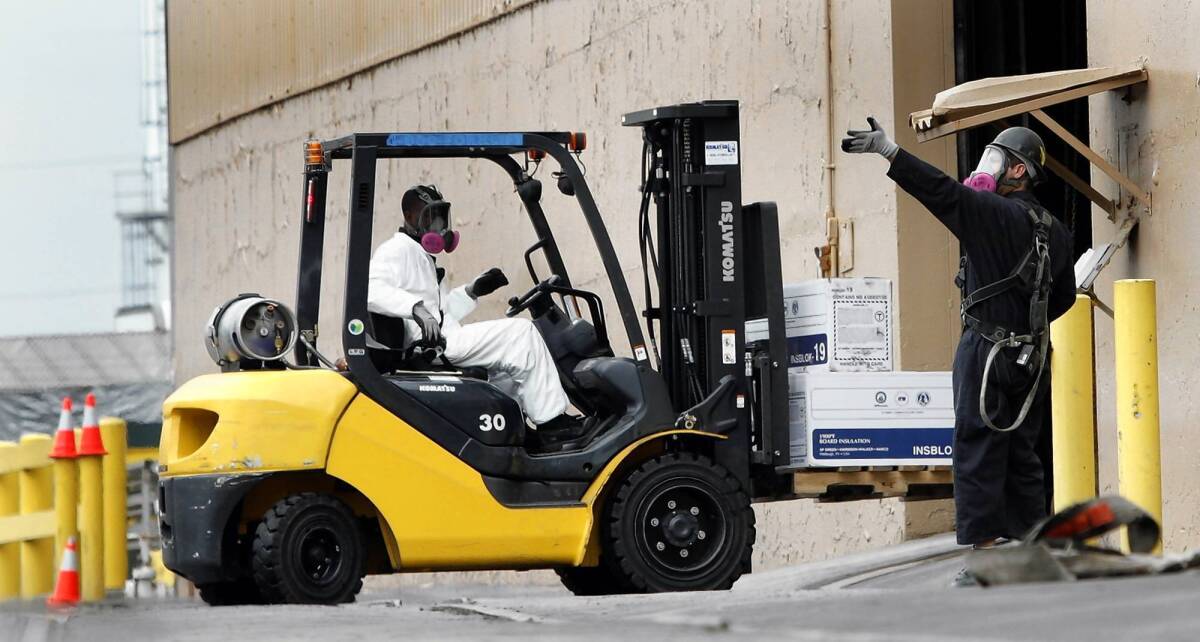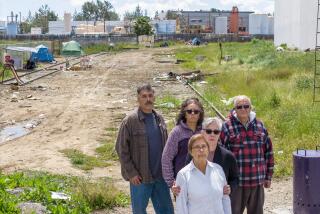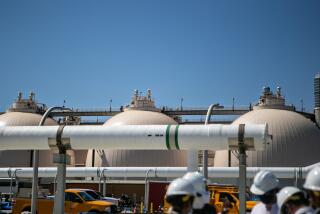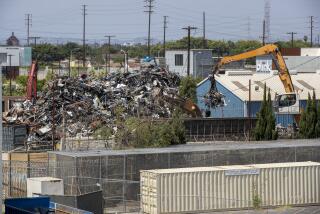L.A. council seeks more state oversight of Vernon battery recycler

Days before a series of public meetings are to begin on the health risks allegedly posed by a Vernon battery-recycling plant, the Los Angeles City Council on Tuesday urged the state to more rigorously regulate the facility.
The council also asked the city attorney to lay out possible legal action against plant owner Exide Technologies, one of the world’s largest makers and recyclers of lead-acid batteries, or to compel the state to ensure that the public is protected from potentially dangerous levels of lead and arsenic.
“We want an explanation for why this has gone on for so long,” said Councilman Jose Huizar, some of whose Boyle Heights constituents have been upset to learn they might face an elevated cancer risk because of the plant’s arsenic emissions. For years it also released harmful levels of lead.
The state Department of Toxic Substances Control suspended the Vernon operation last month after a series of Times articles about the arsenic emissions. The South Coast Air Quality Management District said the plant posed an elevated cancer risk to as many as 110,000 people. In addition, state toxics officials said Exide had continuously released hazardous waste into the soil beneath its plant because of a degraded pipeline.
The facility has over the years been cited for allegedly allowing lead dust to sprinkle down on neighboring rooftops and streets, spilling lead onto the 5 Freeway and contaminating groundwater, according to regulators’ reports. Lead is a potent neurotoxin and is considered unsafe for children even at very low levels.
Still, the plant has operated on “interim status” since the 1980s. It is the only hazardous waste facility in California that does not yet have a permit required by the landmark 1976 Resource Conservation and Recovery Act — intended to ensure the safe treatment, storage and disposal of hazardous waste.
The council’s motion urged state legislators to “conduct a full investigation to determine how a plant with known pollution problems had been allowed to operate for 31 years on a temporary permit.”
The first meeting to inform the public of the health risks from the plant — and the company’s steps to reduce them — is set for Thursday morning at the Huntington Park Community Center, with additional meetings in early June in Commerce, Vernon and Boyle Heights.
“Exide welcomes the opportunity to present to the citizens the work that it has undertaken at its Vernon plant to meet required regulatory standards,” the company said Tuesday in a statement.
The meetings are required by the air district because Exide’s arsenic emissions were estimated to create a risk of about 156 cancer cases per million people among nearby workers over decades of exposure. For residents farther away in Boyle Heights, the risk was estimated at about 22 per million. Under district regulations, the public must be warned when risk from a facility reaches 10 per million.
Earlier this spring, an Exide statement urged residents not to be alarmed by the risk assessment, in part because “the increased arsenic emissions only began in 2009 from one piece of equipment.” It also noted that health risk assessments are “very conservative” and said the assessment might have “significantly” overestimated the risk at some locations.
That has done little to calm residents, some of whom fear that the plant’s pollution is making them sick.
“They are afraid they are going to get cancer,” said Leonardo Vilchis, who lives in Boyle Heights and is director of the community group Union de Vecinos. His 11-year-old daughter recently asked him why they didn’t move: “She said, ‘We shouldn’t be living here. We shouldn’t be breathing this air.’ ”
Exide is fighting the state’s temporary closure order. On May 6, it filed a “notice of defense” with the Department of Toxic Substances Control, contending, among other things, that the plant had operated in compliance with its interim-status authorization and that the state’s allegations are “vague and ambiguous.”
“Exide asserts that there is no imminent and substantial danger to the public health, safety or the environment,” the notice states in part.
A hearing on Exide’s motion for a temporary stay of the suspension order is set for June 3-5 before an administrative law judge in Los Angeles. Within 30 days, the judge will issue a recommendation that the Toxic Substances Control Department can accept or reject.
More to Read
Start your day right
Sign up for Essential California for news, features and recommendations from the L.A. Times and beyond in your inbox six days a week.
You may occasionally receive promotional content from the Los Angeles Times.







